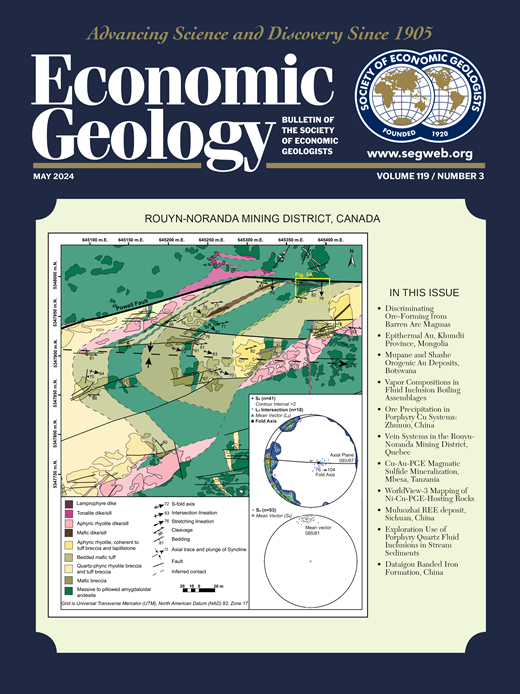Hydrothermal Graphite as a Trigger for High-Temperature Orogenic Gold Mineralization at Haoyaoerhudong, Northern China
IF 4.9
1区 地球科学
Q1 GEOCHEMISTRY & GEOPHYSICS
引用次数: 0
Abstract
Abstract Carbonaceous materials are a key factor controlling mineralization processes in many world-class gold deposits. Haoyaoerhudong is the largest carbonaceous metasediment-hosted gold deposit on the north margin of the North China craton. Gold-bearing orebodies are hosted in carbonaceous slates and schists belonging to Mesoproterozoic rift-related successions. Typical hydrothermal minerals are pyrrhotite, quartz, biotite, graphite, apatite, titanite, and native gold. The ore mineralogy, combined with microthermometry and Raman spectra on fluid inclusions, has demonstrated three stages of hydrothermal activity: (I) quartz-biotite ± sulfide stage associated with gold mineralization (315°–510°C; ~4.8 wt % NaCl equiv; H2O-NaCl-CO2 ± CH4 ± N2 system); (II) quartz-sulfide stage, including quartz-sulfide stringers (IIa, 250°–334°C; ~5.4 wt % NaCl equiv; H2O-NaCl-CH4 ± CO2 ± N2 system) and fractured quartz-sulfide ores (IIb, 234°–308°C; ~4.1 wt % NaCl equiv; H2O-NaCl-N2 ± CH4 system); and (III) post-ore quartz-calcite stage (70°–219°C; ~4.8 wt % NaCl equiv; H2O-NaCl system). The molar ratios of CO2 and CH4 progressively decreased from stage I to II, consistent with the occurrence of graphite in alteration zones. Microscopic observation and Raman spectra suggest that the fine-grained graphite from altered schist (Gr-1/2) and coarse-sized graphite from gold-bearing veins (Gr-3/4) are of high crystallinity and exhibit characteristics indicating a hydrothermal origin. The δ13C values of graphite, varying from −27.1 to −26.0‰ Vienna-Pee Dee Belemnite (V-PDB), suggest that the carbon was of biogenetic origin. Apatite Sr isotopes (87Sr/86Sr: 0.708293–0.708842) and titanite Nd isotopes (εNd(t): –11.76 to –14.84) also indicate contributions from carbonaceous rocks during mineralization. Thermodynamic modeling demonstrates that graphite may have precipitated at Haoyaoerhudong due to cooling and reduction of the H2O-CO2-CH4 fluids at high temperatures. Graphite precipitation would significantly consume CO2 and effectively destabilize Au bisulfide complexes, facilitating the codeposition of pyrrhotite, graphite, and native gold at high temperatures (≥379°C). We infer that deposition of hydrothermal graphite is a crucial process for mesothermal-hypothermal mineralization in sediment-hosted orogenic gold deposits.热液石墨在好窑二虎洞高温造山带金矿成矿中的作用
在许多世界级金矿床中,碳质物质是控制成矿过程的关键因素。好窑二虎洞是华北克拉通北缘最大的碳质变质岩型金矿床。含金矿体赋存于中元古代裂谷相关序列的碳质板岩和片岩中。典型的热液矿物有磁黄铁矿、石英、黑云母、石墨、磷灰石、钛矿和天然金。矿石矿物学、显微测温和流体包裹体拉曼光谱分析表明,该区热液活动分为3个阶段:(1)石英-黑云母±硫化物阶段(315°~ 510°C)伴金矿化;~4.8 wt % NaCl当量;H2O-NaCl-CO2±CH4±N2体系);(II)石英-硫化物阶段,包括石英-硫化物条带(IIa, 250°-334°C;~5.4 wt % NaCl当量;H2O-NaCl-CH4±CO2±N2体系)和破碎的石英-硫化物矿石(IIb, 234°-308°C;~4.1 wt % NaCl当量;H2O-NaCl-N2±CH4体系);(III)矿后石英-方解石阶段(70°-219°C);~4.8 wt % NaCl当量;H2O-NaCl系统)。从第一阶段到第二阶段,CO2和CH4的摩尔比逐渐降低,与蚀变带中石墨的产状一致。显微观察和拉曼光谱结果表明,蚀变片岩中的细粒石墨(Gr-1/2)和含金矿脉中的粗粒石墨(Gr-3/4)结晶度高,具有热液成因特征。石墨的δ13C值在−27.1 ~−26.0‰之间,为V-PDB (Vienna-Pee Dee belenite)碳源。磷灰石Sr同位素(87Sr/86Sr: 0.708293 ~ 0.708842)和钛矿Nd同位素(εNd(t): -11.76 ~ -14.84)也反映了成矿过程中碳质岩的贡献。热力学模拟表明,在高温条件下,H2O-CO2-CH4流体的冷却和还原可能导致了好窑二虎洞石墨的析出。在高温(≥379℃)下,石墨沉淀会显著消耗二氧化碳,有效地破坏金二硫化配合物的稳定性,促进磁黄铁矿、石墨和天然金的共沉积。我们推断,热液石墨的沉积是沉积型造山带金矿中中低温成矿的关键过程。
本文章由计算机程序翻译,如有差异,请以英文原文为准。
求助全文
约1分钟内获得全文
求助全文
来源期刊

Economic Geology
地学-地球化学与地球物理
CiteScore
10.00
自引率
6.90%
发文量
120
审稿时长
6 months
期刊介绍:
The journal, now published semi-quarterly, was first published in 1905 by the Economic Geology Publishing Company (PUBCO), a not-for-profit company established for the purpose of publishing a periodical devoted to economic geology. On the founding of SEG in 1920, a cooperative arrangement between PUBCO and SEG made the journal the official organ of the Society, and PUBCO agreed to carry the Society''s name on the front cover under the heading "Bulletin of the Society of Economic Geologists". PUBCO and SEG continued to operate as cooperating but separate entities until 2001, when the Board of Directors of PUBCO and the Council of SEG, by unanimous consent, approved a formal agreement of merger. The former activities of the PUBCO Board of Directors are now carried out by a Publications Board, a new self-governing unit within SEG.
 求助内容:
求助内容: 应助结果提醒方式:
应助结果提醒方式:


